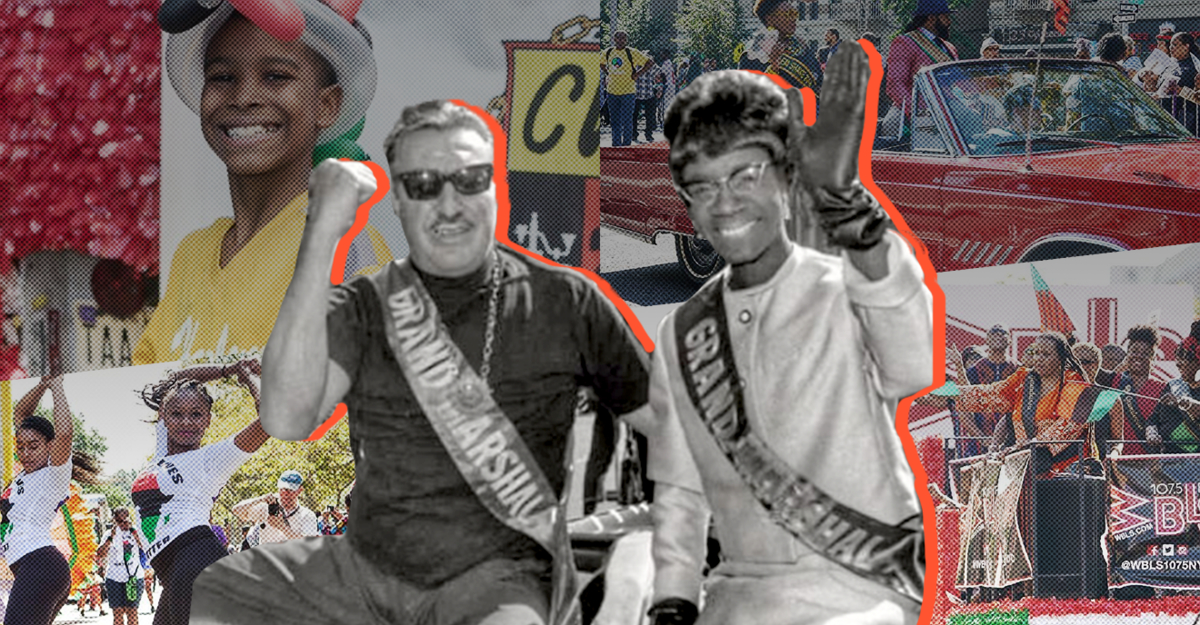Every third Sunday in September, a grand parade celebrating everything that is good and Black takes over the Harlem, New York City, streets. It's a pretty big deal. In fact, The African American Day Parade (AADP) has been a big deal, since its debut in 1969, when Shirley Chisholm and Adam Clayton Powell Jr. served as their first grand marshals.
On September 15, the organization will commemorate 50 years with over 200 prestigious organizations, 25 decorated floats, and three lit HBCU marching bands strutting down Adam Clayton Powell Jr. Boulevard. Classified as a national parade, the AADP website says the celebration typically attracts around 900,000 spectators. AADP advisory board member, Kamaria Buchanan talked with Blavity about the organization's significance.
"The parade route has always been the same, from its inception to now," Buchanan shared. "[The street] was formerly known as Seventh Avenue, but quite a few years ago it was changed to Adam Clayton Powell Jr, Boulevard […] It was once called 'The Boulevard of Dreams.'"
When two Black community leaders Livingston Wingate and Conrad Peters got together — a year after Dr. Martin Luther King Jr.'s assassination — the Boulevard of Dreams was the stage they used to commemorate Black excellence. Eleven other organizers joined them. Under the headline "Africa's Gift to America," Harlem boldly celebrated the present that is Black presence.
"They figured that starting with that [theme] would be good so we could acknowledge our African roots," Buchanan said.
AADP organizers could not have picked a better location or theme to launch what has become one of the most notable celebrations of Black culture. Buchanan dropped impressive facts about the Black businesses that used to line the street. From Lafayette Theater, one of the first theaters to desegregate its audience, to the renowned Apollo Theater tree stump that was cut from the boulevard, many great American assets come from that famous Harlem spot.
"That location is saturated with Black history," Buchanan said. "It's very important that we keep the parade there because our history is there."
Fast forward to now, Harlem remains steeped in Blackness and the AADP will celebrate that rich culture in its favorite neighborhood with Lincoln University's Orange Crush Roaring Lion Marching band leading the way. The organization selected its 2019 grand marshals based on this year's theme, "Integrity & Transparency = Good Government." While this year's honored guests will include some of our brightest political and judicial leaders, AADP is far from political and honors Black leaders in business, education, health, as well as arts and culture.
"When it comes to politics, we try not to pick sides," Buchanan said. "We want to make sure that everyone feels welcomed, but we definitely take the initiative to support Black political leaders because we understand for them, it's a different fight. As an African American, you face more challenges than the average politician."
District 30 New York State Senator Brian A. Benjamin and Manhattan Borough President Gale Brewer are among the nine grand marshals listed on AADP's website. Past notable grand marshals include; actress Ruby Dee, actor Denzel Washington, director Spike Lee, and civil rights activists Al Sharpton and Jesse Jackson. Aside from producing the national parade, AADP has participated in voter registration, issuing academic scholarships and offering internships to young community members.
As the AADP marks its 50th year, it acknowledges several changes and rebranding that have taken place. For starters, they stopped accepting funds from companies, including cigarette and alcohol establishments, that harm the Black community. They've also taken an initiative to reach out to the newer generation, inviting Black millennials like Buchanan to actively participate on its advisory board. As such, the organization's integrity continues to rise and the group continues to produce one of the most lit parades in America.
When it comes to the organization's history and growth, Buchanan has a lot to say.
"Now the world is changing. People are recognizing [Black] as beautiful. People are willing to have conversations about us," Buchanan said. "We gotta make sure we stay true to our culture. At some point, the baton has to be passed […] we can take what's already been built and make it better."
Guests can get details about The 50th AADP parade route and keep up with the organization's upcoming plans on its website. The 2019 parade starts at 12 p.m. on the corner of 111th Street and Adam Clayton Powell Jr. Blvd.
